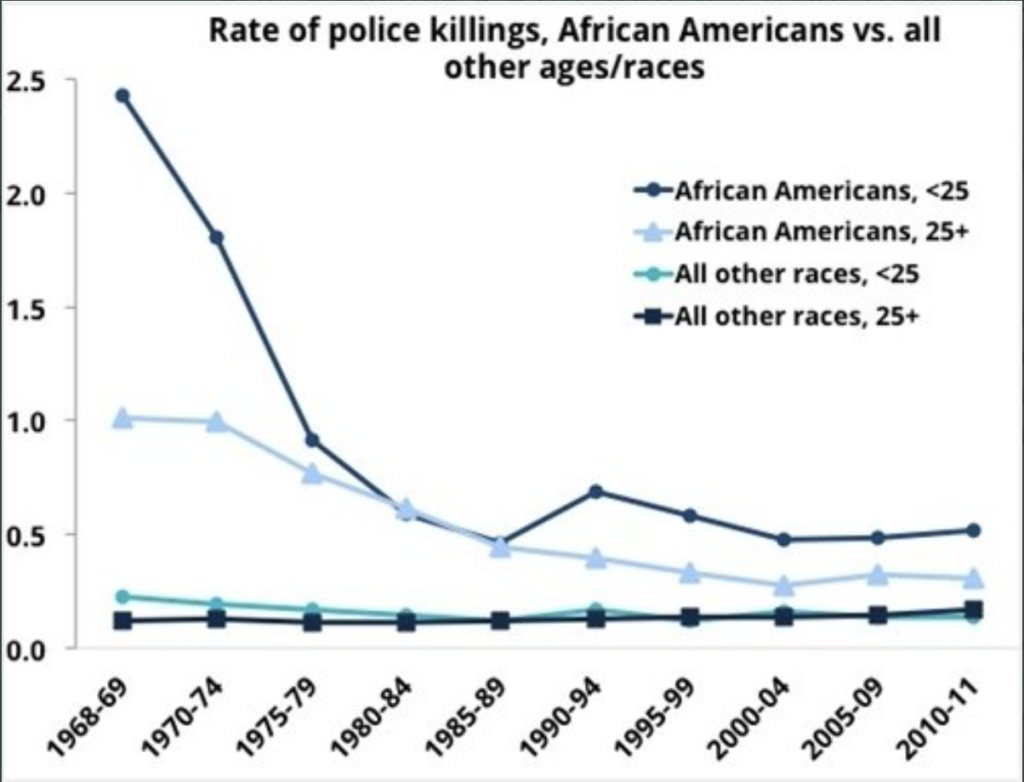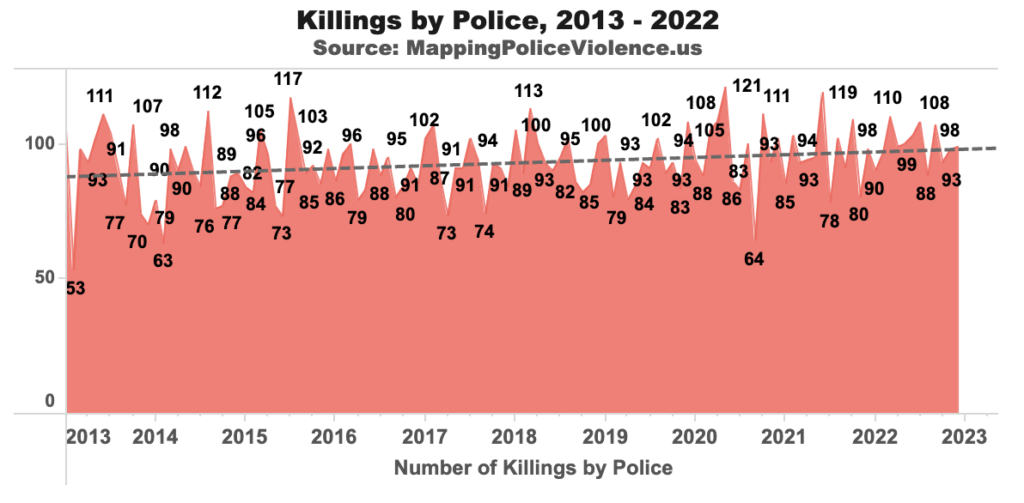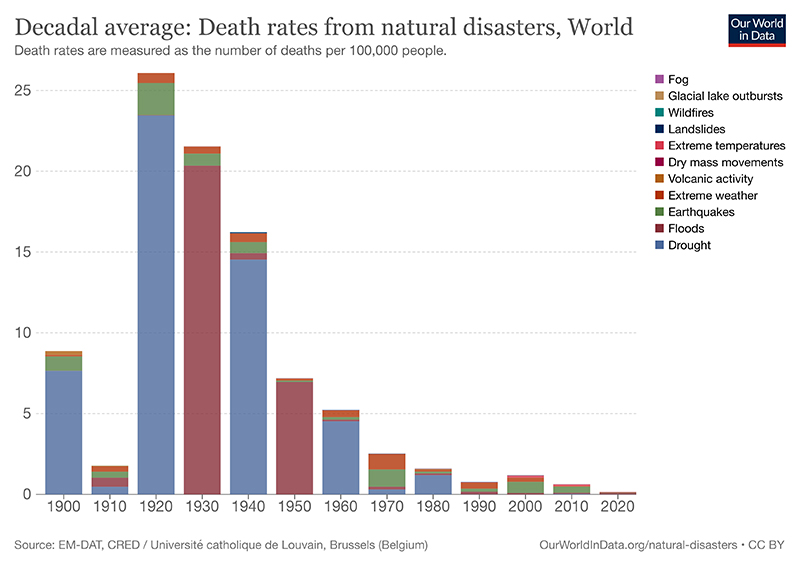Volcanoes are erupting in The Philippines, but on-fire Australia received some welcome rain. The Iran war cries have been called off and The Donald’s military powers are about to be hamstrung by the Senate. Meanwhile, his impeachment trial is starting, and we’re all on Twitter for a front-row seat.
What Could Go Right? Ten good news stories about kids
And, have police killings in the US gone up or down over time?
This is our weekly newsletter, What Could Go Right? Sign up here to receive it in your inbox every Thursday at 6am ET. You can read past issues here.
Ten good news stories about kids
Every once in a while, other outlets do my job for me. This 2022 roundup from Human Rights Watch came out in December, but there was so much news in it that The Progress Network (TPN) team hadn’t previously caught in our news trawl that I would like to share it anyway, though a touch on the late side. Their “ten good news stories for kids” is actually about kids, not for them, and includes far more than just ten. Click to read it all—there’s no paywall—but here are some favorites. Quoting directly:
- Zambia and Mauritius banned all corporal punishment of children, while Comoros banned corporal punishment in schools, and Cuba banned it in the home and alternative care. Sixty-five countries now prohibit all violent punishment of children. Forty years ago, there was only one.
- Cuba, England, Mauritius, Wales, and Zambia ended all child marriage. England, Mauritius, and Wales eliminated exceptions that allowed children under 18 to wed, while Cuba’s new Family Code raised the marriage age from 14 to 18.
- Nigeria and Burkina Faso each agreed to end the military detention of children suspected of involvement with armed groups and ensure they receive support in reintegrating.
- In the United States, the supreme courts of New Jersey, North Carolina, and Tennessee ruled that extreme sentences for child offenders were unconstitutional.
Tyre Nichols, revisited
We received a lot of feedback on our last newsletter about Tyre Nichols. Thank you for sharing your thoughts! I wanted to add two additional points to the discussion from last week. One is to zoom out, as we often do here at TPN, to acknowledge the progress that has been made when it comes to police killings. Take headlines such as this Guardian one that killings by US police have reached a record high in 2022 with a grain of salt. This makes it sound like the police have gotten more deadly over time, when the opposite is true:

The Guardian article linked to above does clarify in the body text that the “record high” is counting from 2013. And it is true that the number of people killed by police has gone up since then. But it is not as large of an increase as your mind might assume after reading “record high.” In 2022, the police killed 1,192 people. In 2013, it was 1,085. (You might be wondering why outlets are comparing against 2013 specifically—it’s because the push to collect better data started around then.)

This is not to say that we should sit idly by and allow increases to continue. We want to see the numbers going the other way, of course. And the US has a particular issue when it comes to holding overly violent officers responsible as well as, as evidenced by data, racial disparities among those killed by the police. (Black people are killed most often, at 7.26 killings per one million people, followed very closely by Native Americans, at 7.24. For comparison, the Latino rate is 3.26, and white, 2.64.) But I did want to highlight what patient pushing has already accomplished, so that we can approach the discussion from an accurate historical view.
Two, I had planned to share this opinion piece from conservative writer and activist David French in the Department of Ideas section, on the “bad apples vs. systemic issues” debate on police violence, but decided to give it greater prominence here in the introduction since its sensibility is hard to find these days. French takes the “systemic issues” position, considering, as I did last week, the lack of accountability when it comes to police violence in the US. But which vantage point is correct is actually not the article’s main focus; rather, it’s a reminder that no matter which “side” we’re on, to remain open-minded and inquisitive when it comes to the narratives being passed to us and that we pass around in turn.
I would also add to French’s thoughts the importance of resisting the urge to limit our compassion and empathy to “our side.” We can be both supportive of all the good people working in law enforcement and supportive of accountability and reform so that cases like Nichols’ are truly rare events. I believe that kind of all-encompassing view is our natural human inclination and within all of our abilities, when we are not blown off-course by political-tribal headwinds.
Before we go
Kenya is the first African nation to formally discuss the right to disconnect. This month the Kenyan Parliament will consider a new bill that would bar employers from contacting workers after hours or on weekends. If passed, Kenya would join France, Italy, Belgium, Spain, Ireland, and parts of Canada and Australia that have enacted rules around when your boss can bother you. In other work-related news, Maryland’s government may pilot a four-day workweek, awarding tax credits to those companies willing to give it a try.
By summertime this year, Australian psychiatrists will be allowed to prescribe MDMA and psilocybin for post-traumatic stress disorder (PTSD) and depression, respectively. There are a lot of unanswered questions, as well as hoops to jump through for psychiatrists interested in the medicines for their patients, but it’s interesting to see this trend gain some steam. Switzerland allows limited use of MDMA and psilocybin, and the US may follow Australia’s example very soon, potentially in 2024.
Below in the links section, the palm oil industry cleans up its act, Gambia makes democratic gains, clean energy jobs soar in the US, and more.

Progress, Please
(Found good news? Tweet at us @progressntwrk or email.)
Other good stuff in the news 🔋
Energy & Environment:
- The enormous heat pumps warming cities | BBC
- Smaller, cheaper flow batteries hold promise for storing intermittent renewable energy at scale | IEEE Spectrum
- Palm oil is actually not that bad (anymore) | Vox
- Researchers develop coating that prevents synthetic fabrics from shedding harmful microplastics in the wash | University of Toronto
- Hydroelectric project by a Rwandan man powers the entire neighborhood | Africanews
- Number of EVs on Australian roads soars as demand exceeds supply | The Guardian
Science & Tech:
- Why Mercedes-Benz’s self-driving milestone is a big deal for autonomous cars | Inverse
- AI reduces timescale of new drug discovery to weeks | Discover
Politics & Policy:
- New rules would limit sugar in school meals for first time | AP
- A court in Kansas is reconsidering the death penalty | NPR
- Where abortion access is protected without Roe v. Wade | Axios
- Amendments in China reinforce protection of women’s rights | China Business Law Journal
- Gambia’s democratic gains top a new index of Africa’s progress in building societies based on justice and equality | CSM
- World’s longest underwater rail and road tunnel will connect Germany and Denmark by 2029 | Euronews
- Black lawmakers in Congress: Historic barrier rapidly declining | Axios
- India announces $4.3B investment in clean energy | Climate Home News
- Police traffic stops face new scrutiny | Bloomberg
Public Health:
- States are leading the way to safer chemicals | Safer States
- California has a solution to expensive insulin: Make its own. | Vox
- China’s ‘clean heating’ policies may have saved thousands of lives | The Hill
- Mpox is almost gone in the US, leaving lessons and mysteries in its wake | CNN
- A single-shot treatment to protect infants from RSV may be coming soon | NPR
- First human trial for experimental Marburg virus vaccine reports success | New Atlas
Society & Culture:
- Finland passes new, progressive trans rights laws on gender recognition | Euronews
- Indian gay couples begin legal battle for same-sex marriage | AP
Economy:
- New data suggests a promising possibility for the economy—that the US avoids big job losses | The New York Times
- America’s mind-blowing labor market | Axios
- Eurozone inflation dropped for a third month | Euronews
- Black entrepreneurship booms | Axios
- Charted: The number of poor workers has decreased substantially since 1991 | Visual Capitalist
- Downward slide in global food prices continues | UN News
- 100K clean energy jobs announced since US climate bill became law | The Hill
TPN Member originals 🧠
(Who are our Members? Get to know them.)
- Excessive use of force: Diagnosing our over-policing problem | Heather McGhee
- After Babel: How do we adapt to a world in which it is so much harder to understand one another? | Jonathan Haidt
- Not every atrocity is about white supremacy | Thomas Chatterton Williams
- Simple things I learned about China | James Fallows
- Can artificial intelligence be ethical? | Diane Coyle
- In the age of AI, major in being human | David Brooks
- Does time favor Ukraine or Russia? | Ian Bremmer
- Can we ‘cure’ cancer? | Jason Crawford
- Let’s add AP Progress to the high school curriculum | James Pethokoukis
- The hidden link between workaholism and mental health | Arthur C. Brooks
- Richard Haass on where America went wrong | Yascha Mounk
- Preempting a generative AI monopoly | Diane Coyle
Department of Life’s Mysteries 💡
(We’re taking a break from the Department of Ideas today for some fun reminders that there are plenty of things about life that we are still discovering.)
One, scientists found out that ice can take a form we’ve never seen before, called “medium-density amorphous ice,” which may play a role in our search for life on other planets.
Two, say hello to a new species of anglerfish, a type of fish that looks like a “satanic potato” and whose mating strategies bring commitment to a whole new level: “A male latches on to a female, their body tissues fuse, and he never lets go.”
And three, step aside, librarians. A transcription service powered by AI discovered a previously unknown play by a famous Spanish author.
Until Next Time
BREAKING: President to show up and say something to Congress. 🚨😲


